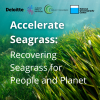|
Posted: 24 October 2024
 ‘Protecting the ocean so that it continues to protect us’
Leading European ocean scientists, including Dr Katya Popova from the UK’s National Oceanography Centre (NOC), have launched Navigating the Future VI (NFVI), providing governments, policymakers, and funders with robust,...
‘Protecting the ocean so that it continues to protect us’
Leading European ocean scientists, including Dr Katya Popova from the UK’s National Oceanography Centre (NOC), have launched Navigating the Future VI (NFVI), providing governments, policymakers, and funders with robust,... |
|
Posted: 23 October 2024
 New research supported by National Oceanography Centre (NOC) scientists has found that oceanographic connectivity (the movement and exchange of water between different parts of the ocean) is a key influence for fish abundance across the Western Indian Ocean (WIO).
Connectivity particularly...
New research supported by National Oceanography Centre (NOC) scientists has found that oceanographic connectivity (the movement and exchange of water between different parts of the ocean) is a key influence for fish abundance across the Western Indian Ocean (WIO).
Connectivity particularly... |
|
Posted: 9 October 2024
 A new programme announced today by Climate Impact Partners and Deloitte, in collaboration with Project Seagrass, will channel critical funding to the UK’s National Oceanography Centre (NOC) to support UK seagrass restoration and unlock long-term finance to save and restore seagrass meadows...
A new programme announced today by Climate Impact Partners and Deloitte, in collaboration with Project Seagrass, will channel critical funding to the UK’s National Oceanography Centre (NOC) to support UK seagrass restoration and unlock long-term finance to save and restore seagrass meadows... |
Understanding regional climate change essential for effective climate adaptation policy, study finds Posted: 1 October 2024
 A new study of regional climate data has highlighted a need for a region-specific focus on emerging climate change signals to underpin more effective local adaptation policies.
The study, co-authored by scientists from the National Oceanography Centre (NOC) and published in Frontiers in...
A new study of regional climate data has highlighted a need for a region-specific focus on emerging climate change signals to underpin more effective local adaptation policies.
The study, co-authored by scientists from the National Oceanography Centre (NOC) and published in Frontiers in... |
|
Posted: 26 September 2024
 The UK’s National Oceanography Centre (NOC) is trialling the use of a fossil-free marine diesel to fuel the Royal Research Ships (RRS) James Cook and Discovery.
Use of hydrotreated vegetable oil (HVO), made from used vegetable oils and fats and non-food crops, is able to significantly...
The UK’s National Oceanography Centre (NOC) is trialling the use of a fossil-free marine diesel to fuel the Royal Research Ships (RRS) James Cook and Discovery.
Use of hydrotreated vegetable oil (HVO), made from used vegetable oils and fats and non-food crops, is able to significantly... |
|
Posted: 24 September 2024
 The future direction of the UK’s marine research infrastructure and how to succeed in taking on solo global ocean challenges are on the keynote billboard for this year’s tenth Marine Autonomy and Technology Showcase (MATS), organiser the National Oceanography Centre (NOC) has announced...
The future direction of the UK’s marine research infrastructure and how to succeed in taking on solo global ocean challenges are on the keynote billboard for this year’s tenth Marine Autonomy and Technology Showcase (MATS), organiser the National Oceanography Centre (NOC) has announced... |
|
Posted: 20 September 2024
 A British adventurer sailing single handed around the world – after first cycling and flying the earth’s circumference – has partnered with the UK’s National Oceanography Centre (NOC) to add ocean science to his latest one-man mission.
NOC ambassador James Ketchell will...
A British adventurer sailing single handed around the world – after first cycling and flying the earth’s circumference – has partnered with the UK’s National Oceanography Centre (NOC) to add ocean science to his latest one-man mission.
NOC ambassador James Ketchell will... |
|
Posted: 20 September 2024
 Nearly 20 years of continuous data tracking the behaviour of a major system of ocean currents that underpins Western Europe’s mild climate is now available from the UK’s National Oceanography Centre (NOC).
The data from the international RAPID programme, which has been observing the...
Nearly 20 years of continuous data tracking the behaviour of a major system of ocean currents that underpins Western Europe’s mild climate is now available from the UK’s National Oceanography Centre (NOC).
The data from the international RAPID programme, which has been observing the... |
|
Posted: 18 September 2024
 How does the sand predict climate change? Could you be a space photographer? What’s life like on a Royal Research Ship?
Book your ticket to a free event of family fun during which you can find the answers to these, and many more fascinating questions.
The Natural Environment Research...
How does the sand predict climate change? Could you be a space photographer? What’s life like on a Royal Research Ship?
Book your ticket to a free event of family fun during which you can find the answers to these, and many more fascinating questions.
The Natural Environment Research... |
|
Posted: 16 September 2024
 A new study, co-authored by scientists at the National Oceanography Centre (NOC), has found that a key component of a major system of ocean currents that keeps the Northwest European climate mild has remained stable for the past four decades.
The study of the Florida Current, which forms a major...
A new study, co-authored by scientists at the National Oceanography Centre (NOC), has found that a key component of a major system of ocean currents that keeps the Northwest European climate mild has remained stable for the past four decades.
The study of the Florida Current, which forms a major... |
